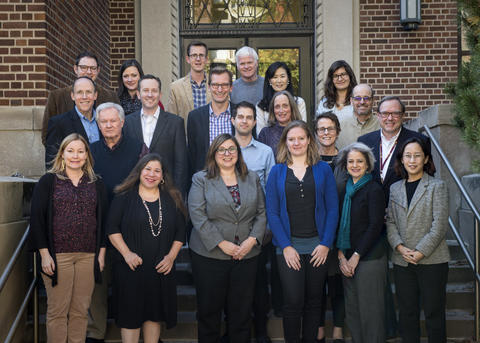The decision was made by the accrediting council on April 26, 2019.
The Hubbard School of Journalism and Mass Communication is proud to announce its reaccreditation by the Accrediting Council on Education in Journalism and Mass Communications (ACEJMC).
In October 2018, the Hubbard School underwent an extensive internal and external review, which is conducted every six years by the ACEJMC. The School was visited by a site team of journalism educators and professionals. After its review, the site team recommended full accreditation in its final report.
The accreditation process begins with an intensive self-study: a complete evaluation of all the School’s activities throughout a six-year period. The report included detailed information about all facets of the Hubbard School’s undergraduate program and features nine accreditation standards: mission and history; curriculum; diversity and inclusiveness; full and part-time faculty, scholarship and research; student services; resources, facilities and equipment; professional and public service; and assessment of learning outcomes.
This 162-page document (with more than 300 pages in supplemental material) was then sent to ACEJMC and four site team members appointed by the accrediting council in early fall 2018.
The site team, led by Douglas Anderson, Senior Research Professor at Arizona State University; Dean Emeritus, Penn State University, also included Caesar Andrews, Leonard Chair in Ethics and Writing at Reynolds School of Journalism, University of Nevada, Reno; Scott Fiene, Assistant Dean for Curriculum and Assessment at the School of Journalism and New Media, University of Mississippi; and Amy Struthers, Interim Dean at the College of Journalism and Mass Communications, University of Nebraska-Lincoln.
During their three-day visit in mid-October, the site team evaluated the School, its programs, faculty, adjunct instructors and the facilities.
In their report, the group cited that “the School bats a thousand on the 20-1 ratio requirement for sections of skills courses; the School’s sparkling four-year graduation rate consistently hovers around 90 percent, clearly one of the best percentages, if not the best, of JMC programs housed in the country’s public institutions; and the School’s permanent endowment of $39 million stands among the largest of the nation’s accredited programs.”
The report also describes the strength of its faculty and curriculum: “The unit offers a curriculum that is carefully constructed, but not rigid, in that it is constantly updated and provides students with many choices for areas of interest. Professionals are engaged in the program’s evolution, helping to ensure currency of the instruction. Faculty members report a passion for teaching, even those with very active research agendas. Students enthusiastically confirm this positive engagement of their professors.”
The site team’s report was presented to the accrediting committee in March 2019 and was accepted by the full accrediting council on April 26, 2019.
“The comprehensive report and the multi-day site visit could not have been completed without the help of every single faculty and staff member,” said Director Elisia Cohen. “Our students also took time to meet with the site team in multiple large group meetings. I appreciate all that the faculty, staff, and students did to support our program’s success. We’re extremely pleased with this result.”
Read the final report online.
About the Accrediting Council on Education in Journalism and Mass Communications
ACEJMC accredits programs in journalism and mass communications at colleges and universities in the United States, Puerto Rico and outside the country. Programs requesting a review by ACEJMC are evaluated every six years and, after the evaluative process, receive one of three determinations: accredited/reaccredited, provisional or denial.
The Council currently has 112 programs with full accreditation status and 5 programs with provisional status. Programs are listed according to their accreditation status. The listing includes the accredited unit, administrator and contact information, degrees and areas of emphases reviewed for accreditation, accreditation site team report (occurring 2012-13 and thereafter), and student information data (retention and graduation data). The provisional programs list also include the standards in noncompliance. For more information: www.acejmc.org
